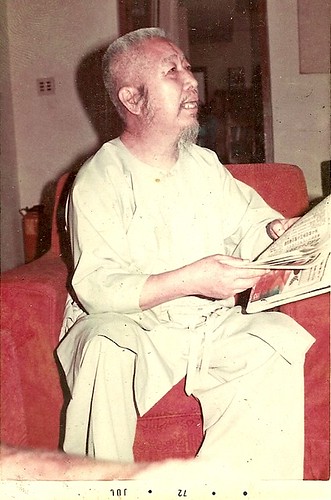從前一位王姓朋友的姊夫姓閻。我不好意思問,但我心想,天啊,
閻王府喜宴
rambling physically and mentally in Wulai, a Tayal aborigine village in the mountains an hour's drive south of Taipei; various and sundry comments, criticisms, analyses, and snide remarks. talovich@mail.com
Talovich's rule on the perversity of unfound objects:
The less time you have to find something, the less likely it is you will find it.
If you start looking for something a day before you need it, you will find it immediately. The amount of time you have left is in a direct inverse correlation to the time you will have to spend searching before you find it.
 我常劈柴,所以最近想買一把好一點的斧頭。。士林慈諴宮對面戲臺下有一家五金行,看上了一把很好的斧頭。跟老闆說,改天再來買,因為等一下要坐捷運去上班,這把恐怕不能帶上捷運。他說,可以呀,這是農具,頭包起來就好了。我向他索取收據,萬一警察問我幹麼帶這個上車。還好,平安無事到達補習班。可是車上坐我對面的那位先生一直看著我,眼神有點奇怪的~~
我常劈柴,所以最近想買一把好一點的斧頭。。士林慈諴宮對面戲臺下有一家五金行,看上了一把很好的斧頭。跟老闆說,改天再來買,因為等一下要坐捷運去上班,這把恐怕不能帶上捷運。他說,可以呀,這是農具,頭包起來就好了。我向他索取收據,萬一警察問我幹麼帶這個上車。還好,平安無事到達補習班。可是車上坐我對面的那位先生一直看著我,眼神有點奇怪的~~
牟宗三乃近代大儒。我念大三、大四時,他曾光臨師大,來國文系演講。于走廊相遇,說「如沐春風」,絕對不是。非常不來電就是了。看他臺風,殊不投緣。我多年困惑:當代儒師,何以如斯不嚮往?
近日讀薛仁明著「論語隨喜」,連篇拍案叫絕,這就是論語!這就是論語!書裏強調,論語第一章:學而時習之,不亦說乎?有朋自遠方來,不亦樂乎?「一開頭就以『悅』『樂』這樣的姿態亮相」。
其意謂,不悅不樂,則離夫子之道遠,講儒應以此為評判的標準:「依此,理學家大概是要落第的,因為他們有苦相。」讀到斯,心中浮出幾十年前牟宗三的樣子,恍然大悟,牟大師雖滿腹經綸,但其人,酸矣酸矣!好像吃了一大口酸菜黃蓮加醋,不服氣但也不敢吐出來;鹼性體質的人只要靠近他站一下就會中和血液的鹼性。讀這一段,多年問號消散了。
沒想到,讀到下一段,薛先生說,「新儒學『大師』牟宗三,其巨著『心體與性體』……以孔子為中心…前孔子、後孔子,通篇說孔子,卻與孔子的真實生命全然不相應。」
妙!狗熊所見略同!
極力推薦大家讀「論語隨喜」。至于「心體與性體」呢,啊…看完以後我講一下心得就可以了。
In an earlier post, I mentioned the disturbing news, or lack or news, from the Jingpo, or Kachin, in
Jared Diamond said that the Spaniards conquered the
臺北華山藝文中心,一棵榕樹的根已經成為門框了。
Why you don't want banyans growing on your building. Take a careful look at this door, which I photographed on an old building in downtown Taipei. The roots have grown down from the roof and down the sides of the door. It looks nice, but the building will sooner or later be taken over by the banyan.
今天到華山藝文中心看原舞者演「迴夢」,高一生的故事。高一生是第一個接受現代教育的鄒族人,畢業于臺南師範學院,當老師、作曲家。他永遠夾扗部落與外界中間,他一生的課題是傳統與改變的衝突。
臺灣光復,高一生成為吳鳳鄉第一任鄉長。現在臺灣的政治教條將那個時代講的很簡單:『全都是蔣介石的錯,沒甚麼好討論的,所以不許討論。』
但其實,那個時代的動盪、紊亂,我們很難理解。因為蘇聯強盛,毛澤東征服大陸、北韓被金日成征服、胡志明扗越南來勢洶洶,導致美國人心惶惶,McCarthyism崛起,國務院推動的白色恐怖波及臺灣。
鄒人扗嘉義機場與國民黨軍隊打仗後退到山林。嘉義山中有人民公社,早上唱義勇軍進行曲、東方紅,升五星旗。雲林、嘉義山區共產黨遊擊隊橫行。
高一生努力為鄒人設想,于是提倡鄒族自治區的想法;說實扗的,這一招,太不識時勢!後來,因為有共產黨藏匿于阿里山,所以鄉長要負責。高一生被蓋上共產黨的標籤。
另外,好像有些公款問題;鄉長要用錢作鄒族教育款項,卻被密告貪污。鄒人不完全支持他,因為很多族人怪他當年鼓勵鄒族青年為日本人打仗,扗南洋陣亡眾多。
民國四十三年,高一生槍決于臺灣青島東路看守所。
今天我們在百餘公尺之遙的華山藝文中心看這齣戲,我想,高一生若有知,一定很安慰。
Today we went to a memorable performance by 原舞者 the Taiwan Indigenous Dance troupe, commemorating the life of the Tsou (Cou) intellectual Uyongu Yatauyungana 高一生(1908 – 1954). Uyongu was a man trapped in his time. Born in the Tsou tribe in the mountains of central
At the end of World War II, the ROC government made him magistrate of his township. The times around 1950 were confusing, and in
McCarthyism was rampant in the
Uyongu was doing his best for his people, and called for a Tsou Autonomous Region. This was not a politically wise call at a time the ROC was fighting for its life. Communist sympathizers were hiding in Tsou territory, and Uyongu was brought to account. There was some problem with public funds which Uyongu had, apparently, meant to be used for schooling, and he was charged with corruption. In addition, many of the Tsou did not forgive him for encouraging tribesmen to fight and die for
To make a long story short, Uyongu was executed in 1954 in a prison not ten minutes' walk from
The performance was brilliant. 高英傑 Gao Yingjie, Uyongu's second son played the part of Uyongu, and Uyongu’s granddaughter played the part of her aunt. (During today's performance, Uyongu's eldest son sat two rows in front of us.) Almost all the dialogue was in the Tsou language, with the Japanese language songs he composed, and some soliloquies in Mandarin. All but one of the twenty performers are Aborigines, from various tribes.
Of course, one singer stole the show:夏赫尤勞 Hiax Yulau, the 8 year old son of my good friend and neighbor Yulau Yukan. But it goes without saying that the Tayal of
The choreographer was the noted布拉瑞揚‧帕格勒法 Bulareyaung Pagarlava, from the Paiwan tribe; he has choreographed for such famous troupes as NYC's Martha Graham Dance Company. The main props used were bamboo poles and two bamboo ladders (Gao Yingjie informed me that all the bamboo came from Pnguu, where we spent so much time last year). The work was imaginative and moving. I couldn't help thinking that Uyongu would be comforted to see his son interpreting his life just around the corner from where that life ended.

今晚到中正堂國家音樂廳聽「柏林古樂學會樂團」演奏巴洛
This evening we went to the
The star of the show was Maurice Steger, one of the world's foremost recorder players. I have collected his CDs for some years, and wondered if maybe they have speeded up the recording? No, he actually does play that fast, and never misses a note.
Unfortunately, they had only the one performance in
臺灣有很多非常好的小劇團、樂團、舞團,可惜觀眾習慣看電視粗製爛造的俗氣節目,有心欣賞這些非主流的團體的人不多。這是大家的損失。
今年民國一百年。我們前幾天去看一個小劇團的戲,探討自身的心境、臺灣目前處境。演員認真演,演技純熟,佈景、服飾都得體。戲劇很好看;唯一讓我困惑的是,演抗戰後的臺灣,只演兩個項目:二二八與白色恐怖。臺灣六十年來的歷史只有這個可以演嗎?
人之常情,若經噩耗、心理受創傷,便會退縮、蟄伏、失去信心、不敢嘗試。臺灣奇蹟不是一個受過創傷的人民所能締造的。
民國六十年代,臺灣的氛圍是樂觀、堅強的;人民安居樂業、發奮圖強,沒有浩劫餘生的陰影。那時臺灣的氣息很積極,不是遍體鱗傷或心猶有餘悸的。六十年代,若與人談起二二八,他們通常說,這件事情已經過了,我們要向前看,要認真生活,不需要再被那些已經過去的事情束縛。
現代的哀怨、悲情,是八、九十年代政客為了爭權奪利刻意製造出來的情緒。臺灣原來很有朝氣、很長進,不會沒事怨天尤人。
更何況,二二八與白色恐怖到目前沒有一個中肯的結論;現在不容許客觀討論,因為這個問題牽涉到太多政治利益。但請想一想:「白色恐怖」根本不是中文;為甚麼?這與美國國務卿John Foster Dulles脫不了干係。但現在臺灣的「言論自由」不容許這種說法,因為一切的罪惡都要放到蔣中正的頭上。
現在與一般中、老年人談起民國四、五十年代的臺灣,多數人的回憶是美好的:臺灣很窮,處境危艱,生活很辛苦,但很平安、很充實。不信的話,自己去問問一些平凡老百姓他們五十年前的生活;看他們臉上顯出很祥和的神態,想到田裏巷尾、稻味草香、濃厚的人情味、治安好,雖然沒錢,可是大家一樣都沒錢,大家都打拼。大專聯考給每一個人一個平等的機會,只要努力念書,農家子女也可以念國立大學:學費低廉,也有公費。刻苦耐勞的成就感是甜美的。
依我的經驗,如果要概括六、七十年代臺灣的人民精神狀態,就是「打拼」兩個字。每一個人抱著希望,只要努力,就有好日子過。當時的精神,也可以用兩個當時常見的標語來說:「處變不驚」、「莊敬自強」。
不是否認政治問題,而是說,經歷過二二八的人不多,直接被「白色恐怖」波及的人很少;不是說他們沒有悲劇,而是說,他們的經驗不代表這六十六年來絕大多數臺灣人民的生活或經驗。
藝術要為政治服務呢?或者我們採取「民主」精神,以「民」為「主」,政府的存在,是為了服務國家而已;那麼藝術的地位遠遠的高于政治。只能政治為藝術服務,若藝術蘊藏政治企圖,就是出賣了藝術、出賣了民主。
如果劇團隸屬政黨,有固定意識型態,演戲只是為了政治目標,那這樣演有理。但是如果目標是如實敘述臺灣歷史,則失之偏頗。實在可惜,因為劇團其它方面都很用心,但寫到六十年來的臺灣,沒怎麼深入思考就落入俗套,照教條排戲。我相信,以他們的才華,劇本可以寫的更深入、更真實的!

抗戰前,太極大師鄭曼青曾任湖南省政府咨議兼國術館館長。他說,當館長最累人的就是開會。畢竟湖南人吃很多辣椒,所以開會時吵吵鬧鬧,各凭武力高強不相讓,館長要有館長的風範,不方便下去與會員較量較量。他說,一次兩個武人吵的特別凶,某甲指著某乙的鼻子說,「你有甚麼了不起?看招!」跳起來,用前額將會議桌撞了一個很大的洞~~~喂,先生,會議桌要錢呢!很無奈,哭笑不得。民國六十幾年聽他敘述,還是苦笑搖頭不已。
The taichi master Cheng Manching served as Chairman of the Hunan Martial Arts Association. He said the worst thing about the position was that he had to chair meetings. Hunanese are famously feisty, and every meeting dissolved into chaos, and a Chairman had to set an example, not join in the fisticuffs. The very worst meeting was the time one martial artist, quarreling with another, said, "Oh, you think you're something? Watch this!" jumped up, came down, and broke the conference table with his forehead. Cheng could only stand by and remind the members that tables cost money…
www.flickr.com
|